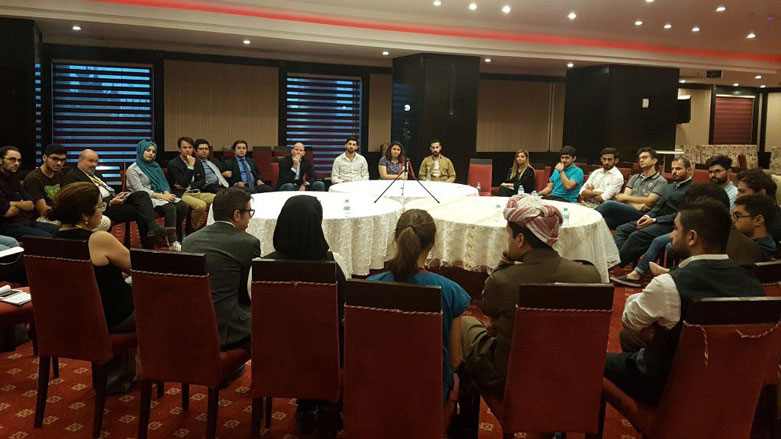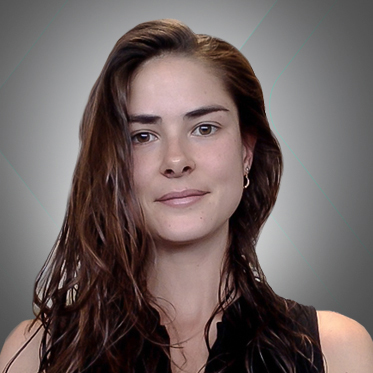Kurdistan should respect, promote pluralism and multiculturalism: Youth leaders

ERBIL, Kurdistan Region (Kurdistan 24) – As polls shuttered on Monday night across Kurdistan and election officials began tallying results of the nationwide Independence Referendum, a group of local youth leaders and international observers gathered at an Erbil Hotel as part of the Global Shapers Community Erbil Hub's year-long initiative to spark discussions.
Amid excitement about the day’s democratic proceedings, the group began a dialogue about one of the most vital questions Kurdish society will face in the coming years: co-existence and social cohesion.
“We need to figure out a way that we can all live together in this new country,” offered Salar Faiq, a young engineer. The young attendees, many with ink-stained forefingers denoting their participation in the day’s vote, discussed how political, ethnic and religious divisions had plagued previous generations.
For millennial youth today who were born and raised in a stable, self-governing Kurdistan, many of those biases are dissipating.
“We need youth to do something new. It's our time, and our generation should do something different from our parents,” said Ilaf Sabagh, a nineteen-year-old student.
While the diversity of ethnic and religious groups is one of the Kurdistan Region’s greatest strengths, social integration remains a challenge. President of the Kurdistan Region Massoud Barzani pledged a future state of Kurdistan would be secular, not an ethnic one.
“Co-existence is something to be very very proud of, but there is a lack of interaction as well,” said Biza Barzo, who helped organize and moderate the event on behalf of the Global Shapers Community.
Many of the attendees lamented the fact that different communities remain socially isolated from one another. Sabagh said that she had never met young Christians before arriving at college, despite the fact that some 320,000 followers of the faith live in Kurdistan.
Now, however, after mingling on campus, Sabagh says she counts Christians among some of her closest friends. “Our generation now, we do coordinate with each other,” she said. “I share with them on my social accounts.”
Technology, many of the young people said, allows for greater connectivity between communities. “Young people like me are more exposed to other cultures,” said Sher Al-Mala Khudur, an eighteen-year-old. “We have the internet; we have TV.”
The maturing generation can learn from one another, expanding their worldview by tweeting, snapping, and insta-exchanging with peers whose views differ from their own. It’s a kind of knowledge gleaned outside the classroom, perhaps even more significant than textbook material, said Kareem Dizaye, a seventeen-year-old.
“Education is more than just the educational system; it also lies in interactions,” he explained.
Attendees spoke frankly about how minorities should be incorporated into a new social framework should Kurdistan become an independent state following the referendum.
“If we're going to build a country that is for only Kurds, then it's not going to work,” said Faiq. “Being a part of a religious minority, if I don’t feel safe in the new country, then I won't stay,” he said.
Some of the youths present said they had faced discrimination or extra scrutiny because of their minority status. Others said they had tried to hide their minority status to avoid unpleasant questions or attention.
Prejudice exists in Kurdistan like in every society, Sabagh acknowledged, but young people have a will to forge a more united future. “We want to change it. [Prejudice] will become less and less until we get rid of it,” she said.
Political divisions, also, were discussed. While political affiliation was subject of vitriolic playground-jeers even just a decade ago, the younger attendees said that they did not experience such a “yellow-green” divide during their adolescence.
“We never really talk about that. I think it used to be a bigger problem,” shrugged Al-Mala Khudur.
While political divisions leading up to the independence referendum made headlines, Idriss Mukhtar, a twenty-year-old attendee believes that Kurdish people ultimately united over the vote and will continue to do so in the anticipated steps toward statehood to come.
“Independence made us come all together,” he said. “We are much stronger than, let's say, the last few months because right now we have an issue that we are addressing that is not specific to a particular part [of society]. It's all Kurdistani people. We are strong.”
Finding a balance between embracing political and religious differences while forging a new Kurdistani identity will be an ongoing challenge. Should Kurdistan become an independent nation, the onus will be on the Kurdish leadership to embrace political, religious and ethnic pluralism, said Jonas Parello-Plesner a senior fellow at the Hudson Institute, an American Think Tank.
“If that’s where this leads, to real independence, they’re going to have to be responsible for that,” explained Parello-Plesner. “Their politicians can no longer just blame Baghdad for all the ills. They will have to show they can create a multi-ethnic society where citizens are treated completely equally.”
There is reason to be hopeful, says Barzo. The Global Shapers Community will continue to bring diverse young people together to talk about these difficult issues, hashing out ideas for the future of Kurdistan.
“One main thing that we can do as the civil society, and for people who want to drive change in our age group, is to create nonlabeled- platforms for people to get together; Not labeled by any political party, any religion, any sect any ethnic background,” she said.
“We're trying to showcase to the community that you can really do things in your own capacity…. If we're not going to shape the future of Kurdistan, who will?”
Editing by G.H. Renaud
